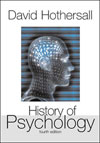 History of Psychology, 4/e David Hothersall,
Ohio State University
German Psychologists of the Nineteenth and Early Twentieth Centuries
Chapter Outline
Psychophysics- Gustav Fechner
- Education
- Ernst Weber
- De Tactu
- Absolute Threshold
- Two-point Discrimination Threshold
- jnd
- Weber's Rato
- Elements of Psychophysics
- S=k log R
- Psychophysics in Perspective
- Contemporary Use
|
 |  |  | Hermann Ebbinghaus- Ebbinghaus's Early Academic Career
- Concerning Memory
- Nonsense Syllables
- The Ebbinghaus Experiments
- Number of Repetitions
- Relearning Times
- Savings Scores
- Forgetting Curve
- Neisser's Challenge
- Sir Frederick Bartlett and the War of the Ghosts
- Research via Demonstration
- Schemas
- Method of Repeated Reproduction
- Ebbinghaus Tackles an Applied Problem
- Greisbach
- Two-point Discrimination Thresholds
- Question of Content Validity
- Analogy and Completion Tasks
- Ebbinghaus in Perspective
|
 |  |  | Franz Brentano- Doctrine of Papal Infallibility
- Brentano's Contribution to Psychology
- Psychology from an Empirical Standpoint
- Act Psychology
- Brentano in Perspective
|
 |  |  | Carl Stumpf- Education
- Music
- Stumpf's Early Academic Career
- Golden Section
- Nativistic Depth Perception
- Stumpf Gains Academic Prominence
- Tone Psychology
- Phenomenology versus Psychology
- Chair of Philosophy at Berlin
- Society for Child Psychology
- Stumpf Studies Sensational Phenomena
- Sound from Pictures of Sound Waves
- Muhamed and Krall
- Clever Hans and Von Osten
- Head of Investigative Commission
- Pfungst
- With Knowledge versus Without
- Stumpf's Later Years
- WWI
|
 |  |  | Oswald Külpe- Education and Early Career
- Külpe Defines a General Experimental Psychology
- Positivist Position
- Research at the University of Würzburg
- Marbe and Weight Judgment
- Bryan and Apprehension
- Watts and Volition and Cognitive Set
- Ach and Decision Types
- Bühler and Imageless Thought
- Moore and Meaning versus Image
- Würzburg Under Attack
- Wundt and Titchener
|
 |  |  | The Lost German Psychologists- Effects of WWI and WWII
|
| 


 2004 McGraw-Hill Higher Education
2004 McGraw-Hill Higher Education